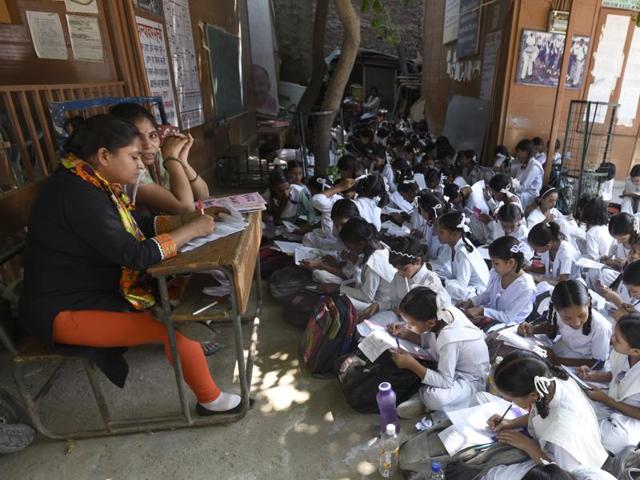New readers at Delhi govt schools make slow, steady progress
The deadline set by the Delhi government to enable children in its schools to read and write draws to an end on Monday but the jury is still out on the success of the scheme.

When the deadline was set on September 5, many claimed that no concrete results would be achieved in such a short span; but many schools claimed they did make some progress. Hindustan Times spoke to teachers, students, parents and government officials to find what impact the scheme had on the ground.
In July 2016, about two lakh students of Class 6 from 1,011 schools under the Directorate of Education were surveyed and it was found that 74% could not read a paragraph from their Hindi textbook, while 46% could not read a simple story prescribed for Class 2 students.
Their English language and Math skills were no better either. Close to half the students could not subtract, if it involved borrowing and 5% had difficulty identifying even single digits.
Read: Faced resistance from my own department over Chunauti scheme: Sisodia
On September 30, schools conducted baseline tests, which examined students’ oral and reading skills in Hindi and English and tested their Math skills. The students were regrouped into readers and non readers by October 3, to give special attention to non readers.
The teachers and principal at the Shaheed Hemu Kalani Sarvodaya Bal Vidyalaya, claim that of the 59 students in classes 6 to 8 that they had identified as non readers, all except 7-10 students have shown some progress.
“Initially, I had 12 students in my class, of which three were absolute beginners. These students could not even identify the letters of the alphabet. Some others could read simple words, but could not read and comprehend longer sentences or complex paragraphs,” claimed Vishnu Kumar, the class teacher of Class 8 non reader Nishtha section.
Similarly, Vanadana Verma, who handles the Class 6 non reader section, said that she had 15 students. “After a lot of individual attention, special exercises and sheer hard work, all my students have shown some progress,” said Verma.
“Ali Raza is my ‘star’ student. He is an Afghani, who could not even identify characters when he first came in. He can now read whole sentences and complex paragraphs. He faces some difficulty in pronunciation because of his different accent but his progress still has been remarkable,” said Verma.
Read: How a non-reader at a Delhi govt school turned into a reader
The school officials maintain their work was no cakewalk. “The first week was the hardest. We had to rebuild their entire basics. We had to start from scratch and teach them the letters of the alphabet, and ensure that they recognised and understood maatras,” said Verma.
“Something had to be done. If we hadn’t taken a pledge when we did, nobody would have. It is a big task but even if a few students benefit from the new scheme, is it not worth it? We were aiming for the moon so that even if we fall, we would land among the stars,” said Saumya Gupta, director, DoE.
While the results at Shaheed Hemu Kalani Sarvodaya Bal Vidyalaya sound promising, others claim it is just that; “too good to be true”. “Literacy is not a mechanical exercise. Reading is not a skill that you can learn in a few weeks. It is a cognitive and linguistic practice that requires that you not only decode the letters and the words, but also be able to understand its complexity and meaning,” claimed Janaki Rajan, professor at Jamia Millia Islamia.
“It needs to be seen if the students are just parroting the texts that have been taught to them in class. If they can’t read any fresh, unseen texts, then we can’t claim that they have made ‘progress.’ Then it becomes training, not real education,” said Rajan.
Gupta claimed that though schools have been tracking the progress of students by conducting regular tests every week, the government will independently reassess all the students after Children’s Day. “We will do test checks, and try to ascertain schools claims of progress. We should have definite data by the end of November,” said Gupta.



